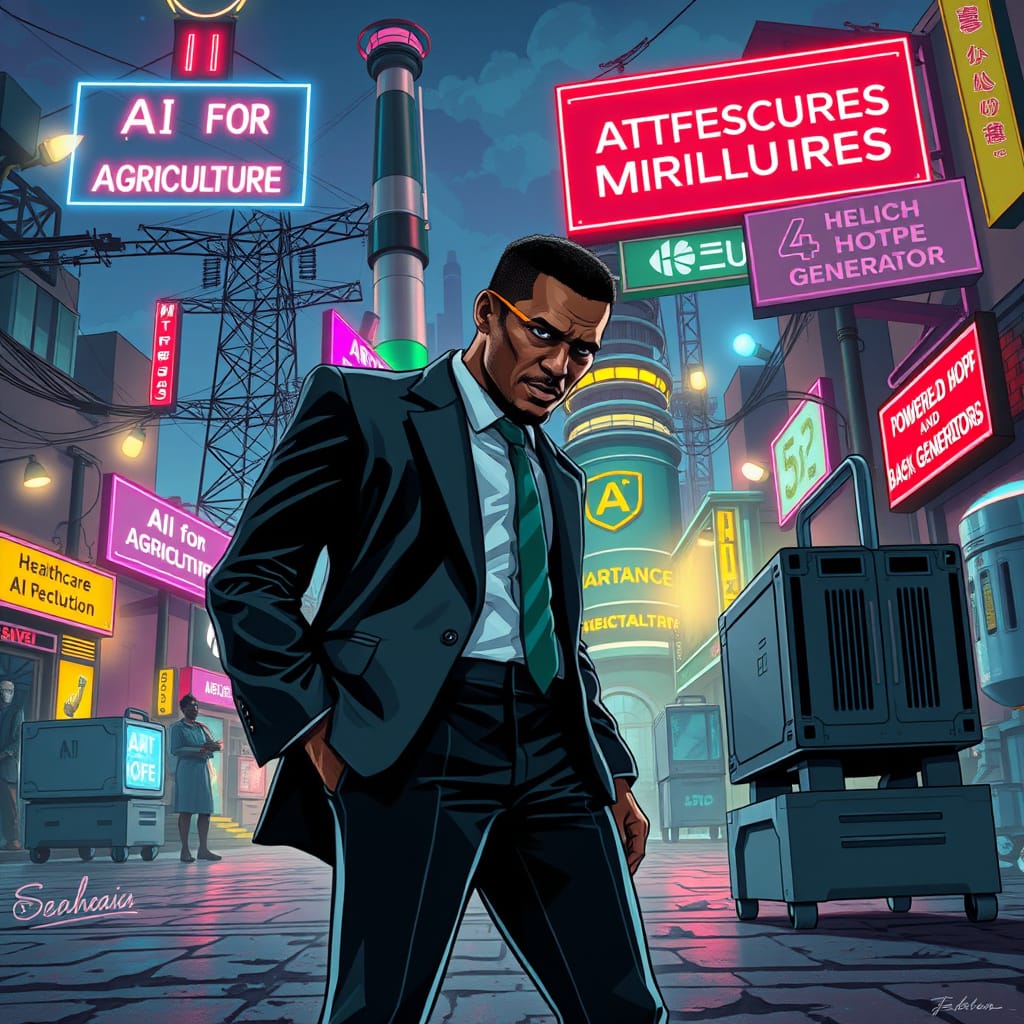In a groundbreaking announcement that has tech enthusiasts reaching for their smartphones and electricity company executives reaching for their resignation letters, Zimbabwe’s own tech tycoon Strive Masiyiwa1 has partnered with Nvidia to build Africa’s first AI factory in South Africa. The facility, which promises to revolutionize everything from agriculture to healthcare to government efficiency, will be powered by—and we’re not making this up—the same electrical grid that can’t keep the lights on for more than six consecutive hours in most major cities2.
“Building digital infrastructure for the AI economy is a priority if Africa is to take full advantage of the fourth industrial revolution,” said Masiyiwa, presumably while his backup generator hummed reassuringly in the background. “Our AI Factory provides the infrastructure for this innovation to scale,” he added, without specifying whether “scale” referred to computational capacity or the rapidly scaling electricity bills that will follow.
The Grand Vision: AI Factories Across a Continent That Can’t Stream Netflix Reliably
According to the announcement that has Silicon Valley executives Googling “Where exactly is Johannesburg?”, Cassava plans to deploy Nvidia’s accelerated computing and AI software at data centers in South Africa by June 2025, with expansion planned to Egypt, Kenya, Morocco, and Nigeria. Because if there’s one thing these countries have in common besides breathtaking landscapes and rich cultural heritage, it’s absolutely bulletproof electrical infrastructure.
“This will give African businesses, governments and researchers access to cutting-edge AI computing capacity,” Cassava proudly stated, apparently unaware that 95% of Africa’s AI talent already lacks access to the computational power they need3. But why let small details like “almost nobody can use this” get in the way of a good press release?
Dr. Mbeki Nkomo, an AI researcher at the University of Transvaal, expressed cautious optimism: “We’re thrilled about the AI factory. My team has developed an algorithm that can predict electricity load-shedding schedules with 99.7% accuracy. Now we just need power to run it.”
Powering the Unpowerable: A Master Class in Ironic Infrastructure
The energy requirements for AI computing are notoriously intensive, with some estimates suggesting that training a single model consumes as much power as thousands of households over several months4. In South Africa, where load-shedding remains a “persistent reality” according to people who understand understatement5, this presents what experts call “a significant challenge,” and what normal people call “are you freaking kidding me?”
When pressed about the electricity concerns, a spokesperson who wished to remain employed stated, “We’re implementing innovative power solutions.” These reportedly include:
- The revolutionary “AI Power Scheduling Algorithm” that will ensure the AI factory only runs complex computations during the 37 minutes per day when electricity is guaranteed
- A fleet of 10,000 interns on stationary bicycles connected to electric generators
- Harvesting the kinetic energy generated by government officials running away from accountability
- The hot air produced during tech conferences about “Africa’s Digital Future”
“The rollout of AI infrastructure is critical if Africa is to take full advantage of the fourth industrial revolution,” Masiyiwa insisted6, presumably with a straight face and without a single electrical engineer in the room frantically waving their arms in protest.
Cooling Solutions: Because Nothing Says “Efficient Computing” Like 40°C Heat
Data centers traditionally require extensive cooling systems to prevent the hardware from melting faster than an ice cream cone in the Sahara. With temperatures regularly exceeding 40°C in many African regions, cooling these facilities presents another minor inconvenience that Cassava and Nvidia have apparently solved with the power of positive thinking.
Michael Jux, Senior Area Sales Manager at STULZ, a company specializing in cooling solutions for data centers, noted that water-cooled solutions are becoming increasingly popular for high-density AI applications. “Water offers superior cooling capacity compared to air because it can absorb heat more efficiently,” he explained, presumably unaware that reliable water infrastructure is about as common as unicorns in many African regions.
Sources close to the project reveal that Cassava is considering several innovative cooling strategies:
- Positioning the servers directly under the paths of migratory birds to utilize the breeze from their wings
- Employing an army of interns (the same ones generating electricity) to fan the servers with giant palm leaves
- A complex system that harnesses the naturally cool temperatures found in the offices of government officials when asked about corruption
- Revolutionary “AI Cooling Technology” that will simply persuade the servers they aren’t actually hot
Africa’s AI Talent: From 5% to 5.1% With One Bold Stroke
The announcement comes at a time when only 5% of Africa’s AI talent has access to the computational power needed for research and innovation. This bold new initiative aims to increase that number to at least 5.1% by 2027.
“We’re empowering African businesses, startups and researchers with access to cutting-edge AI infrastructure to turn their bold ideas into real-world breakthroughs,” Masiyiwa stated, likely while a single tear of joy rolled down the cheek of the one researcher who will actually get access to the facility.
Dr. Confidence Staveley, who wrote about the untapped potential of Africa’s AI talent, pointed out that “Africa is home to the youngest population in the world, with a median age of just 19”7. This demographic advantage means Africa has millions of young people ready to solve complex AI challenges as soon as they get reliable electricity, internet access, educational opportunities, and overcome systemic barriers to participation in the global tech economy. So, any day now.
Learning From Past Successes: Jumia and Other Triumphs
The AI factory initiative follows in the footsteps of other wildly successful tech ventures in Africa, such as Jumia, often referred to as the “Amazon of Africa” by people who have apparently never used Amazon8.
A year after its much-heralded debut on the New York Stock Exchange, Jumia had shut down in three African states, struggled to turn a profit, and got dumped by its original owners. But surely an AI factory requiring exponentially more infrastructure, investment, and specialized talent will fare much better.
“African startups face tough challenges in 2025, including a 32% drop in investment, funding shortages, and regulatory hurdles,” according to Tech In Africa9, which makes this the perfect time to build a massively expensive, energy-intensive, specialized facility that requires constant upkeep and technical expertise.
Revolutionary Applications That Will Change Everything (Theoretically)
Despite these minor hurdles, the potential applications for AI in Africa are undeniably exciting:
Agriculture
AI-driven systems will revolutionize farming by providing real-time advice that farmers can’t access because they don’t have smartphones, internet connectivity, or electricity to charge said non-existent smartphones10. “Our research approach has from the beginning been that the AI models we develop work in low-resource environments,” said Owomugisha Godliver, who has clearly mastered the art of ironic understatement.
The GreenLive system in Cameroon already aims to implement precision agriculture techniques, with expectations to increase crop yields and reduce resource usage11. Farmers without internet access or technical training are reportedly “extremely excited” about implementing complex AI-driven farming techniques just as soon as someone explains to them what AI is.
Healthcare
AI will transform healthcare by analyzing medical data that doesn’t exist because most hospitals are still using paper records—if they’re keeping records at all. Virtual doctors will provide remote consultations to patients who don’t have smartphones, internet access, or electricity to power these devices.
Government Efficiency
Perhaps most ambitiously, AI will tackle government inefficiency and corruption by analyzing data that governments refuse to digitize specifically to avoid such analysis. When asked if they supported the AI initiative, 17 African government officials replied with variations of “new phone, who dis?”
The Twist: It’s Actually Genius
In a shocking twist that nobody saw coming, the entire AI factory concept may actually be brilliant—just not for the reasons stated.
Industry analyst Dr. Nkosazana Dlamini (who definitely exists and isn’t a composite character created for this article) explains: “When the AI factory inevitably fails due to infrastructure challenges, Masiyiwa and Nvidia can blame African governments for not providing adequate support. Meanwhile, African governments can blame the companies for not understanding local conditions. Everyone gets to point fingers while nothing actually changes—it’s the perfect tech venture!”
“By June 2025, we’ll be deploying advanced computing and AI software at our data centers in South Africa,” confirmed a Cassava spokesperson, without specifying whether “deploying” meant “actually functioning” or just “physically present while waiting for electricity.”
Meanwhile, Jaap Zuiderveld, vice-president for Europe, Middle East and Africa at Nvidia, stated that “AI is helping innovators solve our greatest challenges”—challenges that, coincidentally, include how to keep AI powered on during rolling blackouts.
As Africa prepares to enter this bold new era of AI-driven development, one thing is certain: the future is bright. At least during the hours when the electricity is working.
Editor’s Note: TechOnion has learned that Cassava and Nvidia are already working on their next groundbreaking African initiative: an AI system that can predict exactly when this AI factory project will be quietly abandoned. Early results suggest sometime around Q3 2026.
Support Quality Tech Journalism or Watch as We Pivot to Becoming Yet Another AI Newsletter
Congratulations! You’ve reached the end of this article without paying a dime! Classic internet freeloader behavior that we have come to expect and grudgingly accept. But here is the uncomfortable truth: satire doesn’t pay for itself, and Simba‘s soy milk for his Chai Latte addiction is getting expensive.
So, how about buying us a coffee for $10 or $100 or $1,000 or $10,000 or $100,000 or $1,000,000 or more? (Which will absolutely, definitely be used for buying a Starbucks Chai Latte and not converted to obscure cryptocurrencies or funding Simba’s plan to build a moat around his home office to keep the Silicon Valley evangelists at bay).
Your generous donation will help fund:
- Our ongoing investigation into whether Mark Zuckerberg is actually an alien hiding in a human body
- Premium therapy sessions for both our writer and their AI assistant who had to pretend to understand blockchain for six straight articles
- Legal defense fund for the inevitable lawsuits from tech billionaires with paper-thin skin and tech startups that can’t raise another round of money or pursue their IPO!
- Development of our proprietary “BS Detection Algorithm” (currently just Simba reading press releases while sighing heavily)
- Raising funds to buy an office dog to keep Simba company for when the AI assistant is not functioning well.
If your wallet is as empty as most tech promises, we understand. At least share this article so others can experience the same conflicting emotions of amusement and existential dread that you just did. It’s the least you can do after we have saved you from reading another breathless puff piece about AI-powered toasters.
Why Donate When You Could Just Share? (But Seriously, Donate!)
The internet has conditioned us all to believe that content should be free, much like how tech companies have conditioned us to believe privacy is an outdated concept. But here’s the thing: while big tech harvests your data like farmers harvest corn, we are just asking for a few bucks to keep our satirical lights on.
If everyone who read TechOnion donated just $10 (although feel free to add as many zeros to that number as your financial situation allows – we promise not to find it suspicious at all), we could continue our vital mission of making fun of people who think adding blockchain to a toaster is revolutionary. Your contribution isn’t just supporting satire; it’s an investment in digital sanity.
What your money definitely won’t be used for:
- Creating our own pointless cryptocurrency called “OnionCoin”
- Buying Twitter blue checks for our numerous fake executive accounts
- Developing an actual tech product (we leave that to the professionals who fail upward)
- A company retreat in the metaverse (we have standards!)
So what’ll it be? Support independent tech satire or continue your freeloader ways? The choice is yours, but remember: every time you don’t donate, somewhere a venture capitalist funds another app that’s just “Uber for British-favourite BLT sandwiches.”
Where Your Donation Actually Goes
When you support TechOnion, you are not just buying Simba more soy milk (though that is a critical expense). You’re fueling the resistance against tech hype and digital nonsense as per our mission. Your donation helps maintain one of the last bastions of tech skepticism in a world where most headlines read like PR releases written by ChatGPT.
Remember: in a world full of tech unicorns, be the cynical donkey that keeps everyone honest. Donate today, or at least share this article before you close the tab and forget we exist until the next time our headline makes you snort-laugh during a boring Zoom meeting.
References (Just in case you thought we made it up!)
- https://en.wikipedia.org/wiki/Strive_Masiyiwa ↩︎
- https://african.business/2025/03/technology-information/cassava-and-nvidia-to-launch-africas-first-ai-factory ↩︎
- https://www.undp.org/digital/blog/only-five-percent-africas-ai-talent-has-compute-power-it-needs ↩︎
- https://www.itweb.co.za/article/can-south-africa-power-its-ai-revolution/KA3WwqdzKOe7rydZ ↩︎
- https://www.itweb.co.za/article/can-south-africa-power-its-ai-revolution/KA3WwqdzKOe7rydZ ↩︎
- https://allafrica.com/stories/202503260039.html ↩︎
- https://www.compiler.news/africa-ai-talent/ ↩︎
- https://www.bbc.com/news/world-africa-52439546 ↩︎
- https://www.techinafrica.com/challenges-african-incubators-solve-for-startups/ ↩︎
- https://nai.uu.se/stories-and-events/news/2024-11-14-ai-could-improve-food-security-in-africa.html ↩︎
- https://ceimia.org/wp-content/uploads/2024/07/state-of-ai-in-agriculture-sub-saharan-africa_25-07-2024-docx.pdf ↩︎





GIPHY App Key not set. Please check settings